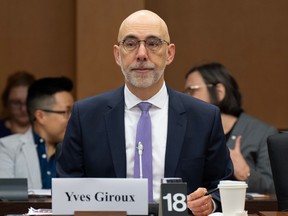Parliamentary Budget Officer Yves Giroux’s updated report came to the same broad conclusion as the previous two

Article content
OTTAWA — The Parliamentary Budget Officer’s corrected analysis of the carbon tax has confirmed most Canadians are getting back more in rebates than they pay in carbon taxes but that the policy will make most Canadians worse off financially.
Parliamentary Budget Officer Yves Giroux corrected a mistake he made in two previous reports, but it came to the same broad conclusion. Those previous reports counted both the fuel tax that average consumers pay and the tax on heavy emitters, which they don’t.
Advertisement 2
Article content
Giroux found the Liberals’ claim that most Canadians receive more in rebates than they pay in carbon taxes is accurate. Only people in the highest income brackets in Prince Edward Island, New Brunswick and Nova Scotia will pay more in taxes than they receive in rebates.
But Giroux also went further, examining the economic impact of the carbon tax, which his analysis found slightly reduces Canada’s overall GDP and adds other costs to the economy. He found in that case, taking in both the direct and indirect cost of the carbon tax, most households are worse off.
“When we use the government’s own numbers and isolate the fuel charge itself, we still find that the average household is worse off, including the economic impact,” he said.
Giroux’s new numbers show that an Ontario family in the bottom 20 per cent of incomes would get $642 more per year back in rebates than they pay in carbon taxes in 2030, when the carbon tax is set to be $170 per tonne. A family in the highest 20 per cent of incomes would clear $28 after paying carbon taxes and collecting rebates.
However, when the economic impacts of the carbon tax are added in the numbers shift. The same Ontario family in the bottom 20 per cent of incomes ends the year $540 ahead, but a family in the top 20 per cent of incomes has a net loss of $3,467. On average, an Ontario family comes out $903 worse per year.
Article content
Advertisement 3
Article content
Giroux’s previous report mistakenly double counted the carbon tax, estimating the costs for an average family at $1,820 per year.
Recommended from Editorial
Environment Minister Steven Guilbeault said the PBO report is proof that the government’s plan is working.
“The PBO report confirms that the vast majority of Canadians get back more through the Canada Carbon Rebate than they pay, while it also acknowledges that the costs of climate change and the benefits of carbon pricing are not accounted for in this report,” he said in a statement.
Guilbeault said the carbon tax is a tool to fight climate change.
“It’s important to remember that this report is compared to the do-nothing approach on climate change advocated by Pierre Poilievre.”
The Conservatives said the PBO report clearly defended their position that the carbon tax was “impoverishing” Canadians.
Poilievre said he stands by his long-held position that he would remove the carbon tax.
“My focus is on axing the carbon tax,” the Conservative leader said. “The carbon tax, which has driven up gas and diesel by 17 cents a litre, has driven up home heating costs by hundreds of dollars every single year.”
Advertisement 4
Article content
Giroux has been criticized for weighing the cost of the carbon tax without considering an alternative. His assessment of the consumer carbon tax assumes nothing will take its place, while keeping in place all of the government’s other carbon tax policies.
Giroux said it is not his job to weigh proposed government policies.
“Everything you do on climate change will have impacts, so we looked at the government’s proposal and estimated its impact. It doesn’t mean that we’re saying you should do nothing. That’s not at all what we’re saying,” he said. “We don’t say this proposal is better than that one. Nor do we do cost benefit analysis.”
The PBO also found the consumer carbon tax is responsible for a 13-megatonne reduction in greenhouse gases by 2030. By contrast, the carbon levy on large emitters — such as oilsands mines and coal plants — is much more significant, adding up to 62 megatonnes of reductions.
Guilbeault said the 13-megatonnes of the consumer price is the equivalent of removing 26 million vehicles from the road. He said the Liberal plan is about many policies working together.
Advertisement 5
Article content
“Our plan has over 100 measures and no single measures will allow us to achieve our 2030 targets. The consumer portion of carbon pricing is very important,” he said.
Poilievre has been asked several times if his pledge to “axe the tax” includes the levy on large emitters. He said Thursday that policy is largely in the hands of provinces.
“They are under a different policy that is pretty much run by the provinces. The federal government is not administering that policy in almost any province.”
National Post
rtumilty@postmedia.com
Get more deep-dive National Post political coverage and analysis in your inbox with the Political Hack newsletter, where Ottawa bureau chief Stuart Thomson and political analyst Tasha Kheiriddin get at what’s really going on behind the scenes on Parliament Hill every Wednesday and Friday, exclusively for subscribers. Sign up here.
Our website is the place for the latest breaking news, exclusive scoops, longreads and provocative commentary. Please bookmark nationalpost.com and sign up for our daily newsletter, Posted, here.
Article content







